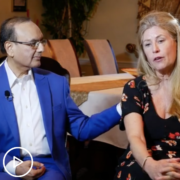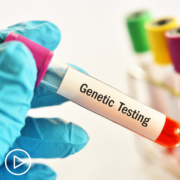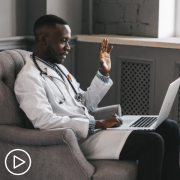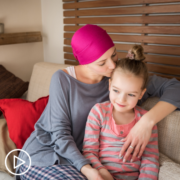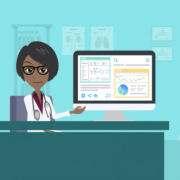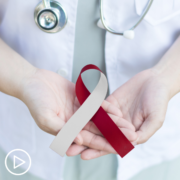Diana’s Story: How Connecting with Another Head and Neck Cancer Patient Saved My Life
Diana’s Story: How Connecting with Another Head and Neck Cancer Patient Saved My Life from Patient Empowerment Network on Vimeo.
After Diana’s cancer diagnosis, she was told that she had only months to live. But, after meeting fellow head and neck cancer patient Sajjad Iqbal online, Diana’s path changed dramatically and she is now cancer-free. Hear their inspiring story about the power of connecting with other patients.
Transcript:
Sajjad:
My name is Sajjad Iqbal. I am a physician and also a cancer patient. I have the honor of serving on the board of Patient Empowerment Network.
Diana:
I’m Diana Craig from Auckland, New Zealand.
Sajjad:
I was diagnosed with a gland cancer, which is a salivary gland, on the left side of the face. The actual histology was a salivary duct carcinoma. It was diagnosed in February of 2002.
Diana:
In January of 2018. I was diagnosed with squamous cell carcinoma HPV 16 on my tonsil and soft palate.
Sajjad:
I do a lot of counseling for the cancer patients and mentoring and advocating and all that. And as a part of that, I have joined a head and neck cancer support group, which is based in New Zealand. It’s on Facebook. And there are some great people there who advise together cancer patients. Diana posted a cry for help back in May of this year, May of 2019, where she was just given the news that her cancer had recurred in her lungs and near her trachea. And her oncologist gave her a very grim prognosis and he thought that the medication had a very small chance of success.
And he told Diana she had a few months to two years to live. Diana was devastated. She posted on that Facebook group, and I reached out to her to introduce myself, to tell her how I have managed my own cancer, and I told her that I could try to help her if she would be willing to share the information with me.
Diana:
Initially, I hadn’t heard of him before.
And I felt I needed to do some research, and I was told by everybody what a good guy he is, and to absolutely go down that road. So, I happily gave my information and certainly after the first conversation or interaction with him, I knew I was in good hands. Very much so. It was, to me, I used to call him my angel, my guardian angel, because I really felt safe and informed and encouraged. And his mantrais hope and determination and that is such a valid mantra when you go through cancer.
And it’s something that I said to myself oftentimes because it was so poignant, and it’s everything that you have to be and do to empower yourself and to be proactive, to find the best possible outcome for yourself.
Sajjad:
You know, as you know, I have written a book about my amazing cancer journey. The book is called Swimming Upstream. And a lot of other people have found it very inspirational. So, my story was not a whole lot different from Diana in this respect: that I was given a very grim prognosis back in 2002.
I was told that I had less than 30% chance of surviving for two years and I was also told that there was no five-year survivors with this cancer. And I made it my goal to beat the odds. And I used to say that in that case, I’ll be among the 30% and if no one has survived five years, well, I’ll be the first one. So, the hope and determination that Diana just mentioned, that’s my motto. Hope and determination. And I tried to instill that in Diana.
Diana:
It certainly empowered me or put me in the right direction as to, I mean, I like to be moving, I like to be able to fight the fight if I know where to fight to. And also, know what questions to ask. I mean, when you’re in that situation, you are told how it is. And you don’t know what you don’t know. And unless you’ve been informed by somebody else or do the research yourself, and even then, that’s pretty dubious, because you stumble across information that you don’t want to know, and a lot of it’s scare tactics. But with his knowledge, with his background, with his first-hand experience of going through what we have gone through, gave me the confidence to do everything that he said.
Sajjad:
And I always recommend to my friends, other patients, that going to your oncologist about the cancer treatment is so much different than going to a doctor for your blood pressure or your bronchitis or so on.
This is an area where we need to be fully prepared. We need to go in and have a dialogue with our doctors who are treating our cancer and this is a matter of life and death. Literally, life and death. So, there is no room for just sitting there passively and just listening to everything and agreeing to everything. We must ask a lot of questions to our doctor. They should be, not only willing to answer our questions, but they should be welcoming our questions. So, if a doctor does not welcome your questions, does not give you plenty of time, does not explain everything that he or she wants to do, then that’s not the right doctor for you. And you’ve got to move on, and quickly.
Diana:
Where would I be without meeting Sajjad? I would have no hair at this point. I would be in the middle of chemo and probably K-truda. I don’t believe that I would have such a radical improvement so quickly. Because mine had gone after three infusions, which is nine weeks. So, I floundered the first time because I felt like I needed the help and I couldn’t get any. And the last time, I felt so much more in control, and anybody would think I’m a control freak. And let me tell you, I’m not. At all.
And also, being on my own, as well, I didn’t have a partner there to talk to. It was heaven-sent. And I said to him, “If I come out okay, I’m going to come and see you.” And here I am. Coming to see you. Because it meant so much to me. It really meant so much to me. It really did.
Sajjad:
Yes, it did.
The medical science is moving at an astonishing pace to find new medicine, new modalities, to treat cancer. We cannot be – the patient must not get bogged down in the statistics of, oh you have this percent chance of survival, or this percent chance of death. Because those numbers don’t mean anything anymore. They’re old numbers. And to fight the cancer, we need our immune system to be involved in the fight.
If we get depressed, if we lose all the hope, the immune system shuts itself down, and that helps the cancer. So, number one thing is to always have hope. Always remain optimistic. And number two is determination. You determine that you are going to fight this and you are going to survive. And then, having those two tools at your disposal, become the empowered patient. Learn as much as you can about your cancer. Talk to other people, go to the support groups. And, again, let me plug Patient Empowerment Network. Go to our website, learn about the cancer. Then go to your doctor and question them and find out how you can improve your treatment. And that’s the way you fight cancer.

